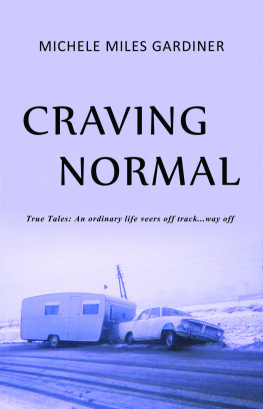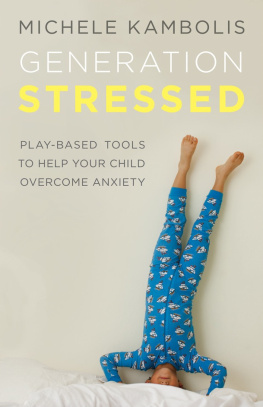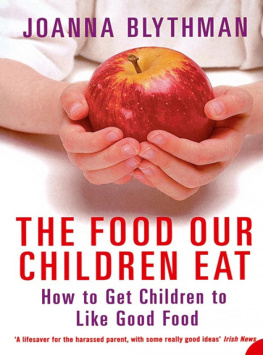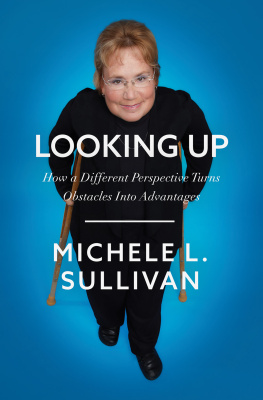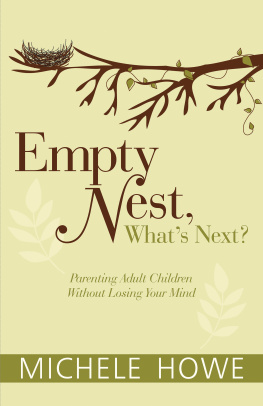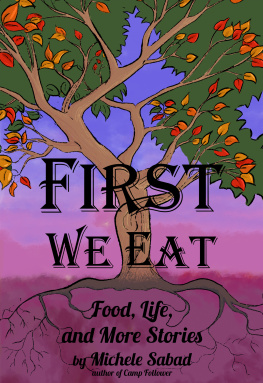Craving Normal
True tales: An Ordinary Life Veers OffTrack Way Off
By
Michele MilesGardiner
Copyright 2019 Michele Miles Gardiner
Published by Exotica Gooch Publishing
All rights reserved. No part of this book may bereproduced or transmitted in any form or by any means, electronicor mechanical, including photocopying, recording or by anyinformation storage and retrieval system, without writtenpermission from the publisher.
Some of the names have been changed. Occasionally,some people and events have been omitted, but only when thatomission had no impact on the substance of the story.
ISBN: 978-1-7337180-4-2
To Ian, who supported and inspired me, and to Lauren,for giving me a reason to share my stories.
Contents
.
Introduction
"Boring! my father blurted into the phone. Well,thats one way to bring our conversation to an awkward halt, Ithought.
Our relationship has been bumpy ever since the firsttime he laid eyes on me, a newborn at San Diego Naval Hospital. Hesaw me and fainted. But who could blame a twenty-year-old sailorfor freaking out? There I wassquirmy, pink, and needy. Hisresponsibility.
When I was a kid, my mother often told me thedetails of the day I was born: how she had the first naturalchildbirth at that hospital; how I opened my mouth to cry as navybugles began playing that April mornings Reveille, and how myfather got woozy and collapsed upon seeing me. His reaction to mybirth set the tone for our relationship.
But for my dad to blurt out Boring! into the phoneas I was telling him about what I had been up to, well, even forhim, such blatant tactlessness made me gasp.
Not long after that awkward telephone moment, my momcalled from her boat on a canal in a village in France. We had anice phone conversation until I referred to her hippie days.
Hippie? You think I was ahippie? Mom asked in a high-pitched and incensed tone after theoffending term slipped from my lips.
Well, yeah. You were a hippie, Isaid. Flashbacks of my once braless and long-haired mother passinga lit joint slid through my perplexed brain. I couldnt believethis was debatable. I mean, while other moms wore frosted lipstickand beehive hairdos and baked cupcakes, my mom ran around nude on abeach in Mykonos, Greece, and baked hashish brownies in Agadir,Morocco.
As a child, this freaked me out because she wasntlike this when we lived in the suburbs. But between 1968 and 1970,my entire life changed. The subdued, pastel world I came intoturned psychedelic. Born in 1964, on the cusp of the counterculturerevolution, not long after JFKs assassination, during the CivilRights Movement and the start of the Vietnam War, I watched thechanges as they happened. My childhood started off one way and wentanother.
For the first four years of my life, after my dadleft the navy, we lived across the Bay Bridge from San Francisco(the city where my parents both grew up) in a suburb calledPleasant Hill. The quiet streets of mid-century ranch homes were sosafe that even at four years old I could pull my red wagon alongthe street and chase the ice cream mans truck without my motherstanding over me.
In the suburbs, I felt comfort in knowing what toexpect. The pattern of my days, beginning with Gumby on TV andending with a bedtime prayer, ebbed and flowed. In between, Momwould do housework and prepare our meals. Right before dinner, myfather would come home with his short-sleeved cotton dress shirtstill crisp, and his smooth cheeks smelling of faded Old Spiceaftershave. Most days unfolded this way.
My parents, in their early twenties at the time,looked so young when they bought our ranch home, the neighborsassumed they were the teenage childrenbrother and sisterof thefamily that moved in. Later, our neighbors were surprised to learnmy parents were the homeowners who had two small children: my babysister, Denise, and me, two and a half years older.
Even though my father worked all week long atLawrence Laboratory in Berkeley, he spent his evenings and weekendscreating thingstotem poles, a koi pond with a wooden bridge, and aplay jailhouse in our backyard, complete with bars and wantedposters. Inside our home, he created oil paintings and collageswith shards of glass, newspaper, and clock faces. His art was theonly color we had adorning our white walls. Otherwise, we seemedlike any other young family on Ahneita Drive in Pleasant Hill,having barbecues on weekends and eating meals together around thedinner table.
Then came the summer of 1967. San Francisco, withthe citys history of beat poets, artists, and vagabonds on thefringe, became a flame for rebellious young people who swarmed likemoths to the light. They arrived with their ideals high, ready tochange our muted, pastel existence into a vivid, psychedelic one. Iwatched the world transform around me.
By the summer of 1968, my mother and father werepulled into the vortex. Theyd take my sister and me to SanFranciscos Golden Gate Park on the weekends. Wed get in our car,pull out of our driveway, listen to a few tinkling tunes on theradio, like Dionne Warwick singing Burt Bacharachs Do you knowthe way to San Jose? or swingy bossa nova numbers like the song Iloved, The Girl from Ipanema, as my mom fed us Vienna sausagesfrom a can and zwieback toast from a box. Soon wed be over the BayBridge and in a different world.
While at Golden Gate Park, my parents relaxed in thegrass below Hippie Hill. My sister and I did somersaults and dancedto conga drums pounded by shirtless men with long hair or afros.The air, perfumed by marijuana, patchouli oil, and Nag Champaincense, swirled above our heads. Wavy-haired women in velvet,lace, and beads undulated in trance-like states as scraggly,barefoot men in torn jeans and suede fringe vests played guitar.They called themselves flower children. I thought, Ha! Theyrenot children! Theyre old. As old as my parents who aretwenty-something.
My clean-shaven father and my mother in her MaryTyler Moore-style flipped hairdo, absorbed the fragrant andelectric air. Soon, Mom became inspired to take our family toexplore Europe. While ironing our familys laundry, shed heard atravel book writer on the radio say, You, too, can travel theworld with children. So thats what my parents decided to do. Atthe time, anything seemed possible. So, why not?
In January of 1969, after selling our home in thesuburbs, everything in it, and our car, my parents took theirfunds, left the United States, and bought a trailer in England. Fornearly two years we roamed much of Europe and Northern Africa, withour trailer home behind us, stopping when we felt like it.
During our first year of exploring the world, my dadgrew a mustache and sideburns on his clean-shaven face. I beggedhim, Shave that thing off! while pointing at the bushycaterpillar-like growth hanging under his nose. He kept themustache and grew his hair so long hed grease it back and tuck itinto the collar of his shirt at border crossings or whenever he hadto deal with any straights. (People in uniforms and suits: cops,border guards, bankers, and other conservative types.) So theywont hassle me, he explained. My mother began wearing her dressesshort and her hair long. They were changing faster than I couldmentally keep up.
As we traveled, each day brought newexperiencesdifferent languages, exotic foods, foreign cultures,and varied landscapes. We explored castle ruins, swam incrystalline water coves, camped near gypsy trailers in lavenderfields of France, and drove through shanty towns in Portugal. Wepicked up a hitchhiking matador who invited us to stay with hisfamily in Salamanca, Spain. In Agadir, Morocco, we rode camels onthe beach, wore robes called djellabas, and drank sweetspearmint tea while nibbling dates and tangerines.
I loved traveling. But things changed so fast I gotdizzy, unable to spot a horizon line to keep me steady. Oursuburban past was my only reference point for what I considerednormal. So when my father built us a rock hut on a beach inMykonos, Greece, and my parents began running around nude, theseactions alarmed me. I still pined for my cozy pink bedroom in thesuburbs, where people wore clothes in public.
Next page
